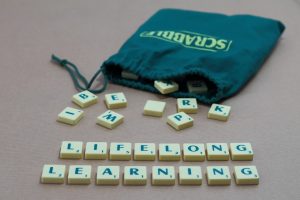
Higher education policy in Australia
Higher Education policy in Australia emphasises a rapidly changing, digitalised and global world where graduates will need to be adaptable and innovative. For example, among the commitments for universities that are itemised in a major policy document from 2016, is “Create and support lifelong learners with the capacity to learn, re-learn, upgrade skills and knowledge and change careers.” (Australian Universities “Keeping it Clever Statement” 2016, p. 16) Subsequent policy documents build on this idea of preparing graduates for lifelong learning. Pitman and Broomehall, 2009, (see reference below) offer a useful analysis of the use of the term “lifelong learning” in Australian universities.
As suggested in the above policy document, and subsequent publication, It is deemed essential for university graduates to have attributes and skills that enable them to “hit the ground running” in the professional or other workplace environments for which they have been studying. So there is a recent emphasis on “authentic assessment” that is as close as possible to tasks and processes the students will experience in professions and workplaces beyond graduation.
Discussion: Have you been influenced?
Have you been influenced by these high level policy directions on university learning, or is this the first you’ve heard of them? (if you haven’t heard of these influences, have a read of the “Keeping in Clever Statement” before commenting). What do you think they imply for how assessment is conducted?
Theoretical foundations of contemporary assessment discussions
The policy influences described above synchronise with the evolution of educational values and theories over the past few decades, with new applications of social constructivist learning and the idea of lifelong learning.
Educator and researcher David Boud has written many papers on the need to balance short-term measurement and certification needs with longer-term learning such as lifelong learning and learning to become a professional or expert in a field. In his papers, he often challenges the divide between “formative” and “summative” assessment and asserts that assessment is an ongoing, reflective process of collaboration and negotiation between students and teachers, rather than a one-off “unilateral act done to students.” (2006, p. 402).
Sustainable assessment in contemporary higher education
In an article written in 2000, then revisited in 2016, Boud sets out his ideas on “sustainable assessment” which prepares students more adequately for life-long learning and professional learning, beyond university graduation. Boud argues that students need to become assessors themselves, and in particular, they need to learn the skills for self-assessment while undertaking university education, if they are to be adequately prepared for their professional workplaces. In this paper, Boud asserts that characteristics of effective formative assessment are also features of “sustainable” assessment in this sense. After reviewing the literature on lifelong learning, Boud proposes a framework for sustainable assessment, which comprises formative assessment processes that feature a positive belief that all students can succeed, a high value placed on quality feedback, and a strong role for reflective self-assessment and peer assessment. (2000, p. 155.)
Are traditional assessment methods fit for purpose in today’s context?
” Neither teachers nor a curriculum drive learning after graduation; it is the desires of learners, the initiatives they take and the context in which learning takes place that are powerful influences.” (Boud, 2006, p. 402)
In this 2006 article, Boud asserts that with concerns such as graduate employability, and global developments like those referred to in Australian Universities policy documents above, there has been a neglect of the role of assessment. The clear implication is that traditional assessments are no longer appropriate in this new era. He points to emerging critiques of both summative and formative assessment practices of the type which have negative effects on student learning and create dependency on others to evaluate and assess them, rather than develop their skills for self-evaluation (2006, p. 400).
Boud warns that traditional assessment puts students in the role of passive recipients of evaluation and judgments by others, that limit current learning and are not appropriate for learning beyond the academic institution. Conversely, the idea of assessing for future learning, beyond graduation, puts students in the role of an active agent in their learning and assessment, which is more commensurate with contemporary ideas and policies on higher education learning.
Tomorrow, we look at the issues and challenges in designing assessment approaches that fit with contemporary educational theory, and touch on some types of assessments that can help students prepare for life beyond the academy.
Discussion: What do you think?
What do you think of this last quote from David Boud? Should assessments within university education attempt to create these drivers for learning? Do essay and exam assessments create passive learners? Can we design traditional assessments that avoid these pitfalls?
References
Boud, D., 2000, “Sustainable Assessment: Rethinking assessment for the learning society” in Studies in Continuing Education, 22:2, 151-167, https://doi.org/10.1080/713695728
Boud, D. & Falchikov, N., “Aligning assessment with long-term learning” in Assessment and Evaluation in Higher Education, Vol 31, No. 4, August 2006 https://doi.org/10.1080/02602930600679050
Boud, D. & Soler, R., 2016, “Sustainable assessment revisited” in Assessment and Evaluation in Higher Education, 41:3, 400-413 https://doi.org/10.1080/02602938.2015.1018133
Pitman, T. & Broomhall, S. (2009) “Australian universities, generic skills and lifelong learning,” International Journal of Lifelong Education, 28:4, 439-458
DOI: 10.1080/02601370903031280
Universities Australia (2016) Keeping it Clever Policy Statement
